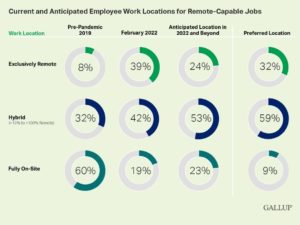Remote vs. Hybrid Work: What is the difference?
Words matter, and when it comes to the words used to describe the changing landscape of work, they matter even more. Two words have been used since the pandemic, hybrid and remote. Although these words have been around for a while, they are now in our daily conversations. But do you know what they mean? Before COVID-19, the word hybrid was used to describe a car, not a work schedule, and remote working was not standard. So the purpose of this blog post is to explain the difference between the two, a little history on the evolution of work, how Work Webb can be used for both of these work schedules, and which option will dominate in the future of work.
Remote Work
Remote work is the practice of employees doing their jobs from a location other than a central office operated by the employer. Such locations could include an employee’s home, a co-working or other shared space, a private office, or any other place outside the traditional corporate office building or campus. Working from home is another phrase used interchangeably for this work schedule, and it has a long history that predates the invention of the internet.
Before the industrial revolution, skilled workers worked from home and sold goods. With the industrial revolution, there came a need for automation and factories. Then after World War 2, we saw the rise of the corporate headquarters, with cubicles and the invention of the eight-hour day. But the advancement of technology, specifically the creation of the internet and computer, remote working took centerstage.
Why is Remote Work Popular
Remote work has become increasingly popular because it benefits employers and employees. For example, remote workers tend to be more engaged and productive when working on their schedules. The graphic below shows the uptick for remote working as well hybrid.

Hybrid Work
Hybrid work is a flexible approach that allows employees to split their time between working in the office and working from home. Several factors are driving the move to the hybrid office, including the increasing popularity of hybrid work and the need for businesses to be more flexible and accommodating to employees. In short, you are in the office, collocated with colleges some days of the week, and working the rest remotely. This type of schedule will vary depending on the industry you work in and what is the most productive for you and your team.
What Will the Future of Work Look Like
Top executives believe Hybrid is the model that will dominate by 2024. In fact, a survey found that 81% of senior executives believe the future of work is a hybrid work model, with over 56% of work done outside of the office meaning remotely. So it looks like both of these options will be in the future.
How Work Webb Can Help
As mentioned in previous blog posts, working from home may not work for everyone. This is where a shared office solution, like Work Webb, comes into play. The option to drop in and get a desk for a day or rent a dedicated office is just two ways a co-working space can assist remote workers. Regarding a Hybrid work schedule, workers can rent our conference room by the hour or day to meet up as needed to collaborate, reducing travel costs for your company.
If you are looking for remote or hybrid office solutions in the Daytona Beach or Melbourne, Florida area, consider Work Webb. Visit our website to learn more and read what our Happy Clients say about our services.
Hybrid vs. Remote: Which is Better for You?
The work landscape has changed in the past two years and many employees are considering hybrid vs. remote work schedules. The 9-to-5 workday is so last century. In today’s 24/7 global economy, employers and employees enjoy the benefits of more flexible work arrangements. There are two primary types of flexible work arrangements: hybrid and remote. A hybrid schedule is a mix of in-office and at-home work, while a remote schedule is 100 percent at-home.
But how do you determine which is the right one for you? Here are some questions to ask if you are considering a hybrid vs. remote work schedule yourself to determine which will work for your individual needs.
Is an office required for your career?
This should be the first question you ask yourself, “Can I do my job the same from home, or do I have to go into an office to be productive.” Some industries, like manufacturing, where employees must be centrally located to get the job done. But what COIVD taught us is there are more industries than we imagined that could go remote or hybrid. So, for example, who would have thought telehealth would ever be a thing? Because how can you practice medicine without physically seeing the patient? Easily apparently with the assistance of technology but not for all health issues.
Doing some soul searching and researching to see if your career can go remote or hybrid for the long term will help you determine your best choice.
How do I work best?
Once you have determined if your industry can work remotely, you need to be honest with the type of worker you are at your job. Regarding a hybrid vs. remote work schedule, do you need watercooler banter to be happy and productive? Or can you work remotely without this type of in-person interaction? Again, COVID taught many of us that we are more social than we may have thought, and this social interaction with coworkers was an important part of our work life. This is why it is essential to ask this question when determining if a remote or hybrid schedule is right for you.
Am I disciplined enough to work remotely?
Remote workers need to stay focused and adhere to a schedule without coworkers, or supervisors, around to monitor them. Be honest with yourself on this question because with the flexibility of a remote schedule comes the responsibility of being self-motivating and productive. A hybrid schedule might be a better option if you fear you lack the dedication to work remotely 100% of the time.
Whether you choose a remote or hybrid work schedule, a shared office solution like Work Webb can assist when needed, no matter which schedule works for you. Whether it is a desk for a day, a conference room rental, or a work address for mail, we have options to meet most needs for both remote and hybrid workers. Visit our website to see what our happy clients say about our services and call us to schedule a tour.
Hybrid Office Evolution
The Hybrid Office Started Before COVID
During the pandemic, employees worked from home. COVID did not start the work-from-home trend. In 2017, FlexJobs and Global Workplace Analytics reported that between 2005 and 2015, telecommuting half-time or more increased by 115%. The United States Census Bureau released this infographic in 2013. This graphic states that advances in technology contributed to the increase of remote workers and gave a breakdown of the industries of these home-based workers. Employers learned during the pandemic was remote workers performed as well as on-site employees. Staff now want to continue this work arrangement. Some employers are considering a hybrid work schedule to keep the employees happy.
Employees Have a New “Worth It” Equation
The Big Compromise
Benefits of Remote Working

When companies worldwide sent their employees home to work virtually due to COVID-19, remote work had a big moment. What became apparent was that employees could be productive and focused when not in the office—in many cases, even more so. As a result, employers everywhere began to understand that remote work works.
Here are some benefits to working remotely:
Better Work-Life Balance
Remote jobs come with adaptable schedules, which means that workers can start and end their day as they choose, as long as their work is complete.
Money Savings
Companies —like Twitter, Square, Shopify, and Facebook, to name just a few—have seen long-term costs savings by having employees working remotely.
Increased Productivity and Performance
Remote working usually leads to fewer interruptions, fewer office politics, a quieter noise level, and fewer meetings. Fewer distractions lead to increased productivity—a massive benefit for both employees and employers alike.
A Happier, Healthier Work Life
Remote, flexible workers tend to be happier and more loyal employees, in part because it has been shown to lower stress, provide more time for hobbies and interests, and improve personal relationships, among other things.
A shared office solution like Work Webb has helped several companies adapt to working remotely. We have a variety of options to choose from that fit most needs. Call us today to schedule a tour and answer any questions. Visit our website to see what our happy tenants have to say about our services.




